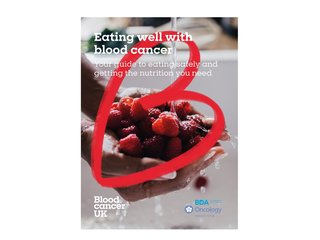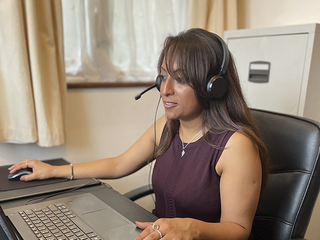Getting ready for CAR T-cell therapy
There are a few steps to prepare before starting CAR T-cell therapy. Here, we explain the tests and other treatments you might have, along with some helpful tips.
What’s the timeline for CAR T-cell therapy?
- Referral to a CAR-T centre – If CAR T-cell therapy is a potential option for you, you’ll be referred to the CAR-T centre closest to you. Here, you’ll meet with a specialist doctor to discuss the treatment in detail.
- Treatment approval – If you choose to go ahead, a panel of clinical experts will review your case to make sure CAR T-cell therapy is the right treatment option for you. They’ll look at your medical history and general health.
- T cell collection – Once approved, your T cells will be collected in a process called apheresis. Scientists will then use these to create your CAR T-cells. You might need some treatment before the collection, called holding therapy. Your hospital team will discuss this with you.
- Bridging treatment – You may have bridging treatment to keep the blood cancer under control while your CAR T-cells are made.
- Tests – During this time, you’ll have some tests to make sure you’re still fit for CAR T-cell therapy. See more about these tests below.
- Prehab – Some hospitals offer prehabilitation (prehab) programmes. Prehab can improve your mental wellbeing and physical fitness before treatment begins.
- Lymphodepletion – About a week before you receive your CAR T-cells, you’ll have chemotherapy, known as lymphodepletion, to prepare your body.
- Infusion day – You’ll go into hospital for your CAR T-cell infusion. Find more information on our Having CAR T-cell therapy page.
- Hospital stay – You’ll stay in hospital for up to 28 days after the infusion to begin your recovery, before returning home.
Tests before CAR T-cell therapy
Before your therapy, you may have several tests, including:
- Echocardiogram (echo): An ultrasound scan of your heart and blood vessels to check your heart’s function and blood flow.
- Electrocardiogram (ECG): Measures your heart’s electrical rhythm to make sure it’s beating regularly.
- Glomerular Filtration Rate (GFR) Test: This checks your kidney function.
- Blood tests: You’ll have blood tests to monitor your blood cell counts and check for viruses.
- CT, MRI, PET scans and bone marrow aspiration: These are used to check how well the blood cancer has responded to treatment so far, and assess any risk of side effects from CAR T-cell therapy.
- Lung function test: Checks how well your lungs are working.
- Chest X-ray: Takes images of your heart, lungs, and chest to check their structure.
- Dental check: A dentist may check your teeth to prevent infection.
Holding therapy and bridging treatment
You might need some treatment before your T cells are collected to help keep the blood cancer under control. This is called holding therapy.
While your CAR T-cells are being made, you might also need bridging treatment, which could include chemotherapy, radiotherapy, or steroids. The aim is to keep you as healthy as possible and keep the blood cancer under control.
These treatments might make you feel unwell, but your hospital team will help keep you as comfortable as possible. It’s important to be open with them about how you’re feeling.
Prehab
Prehabilitation (prehab) is about preparing your body and mind for treatment. It often includes keeping active, eating well and looking after your mental health. Your hospital might have an official prehab programme to help you prepare for CAR-T therapy. If not, they should still be able to give you advice and support to help you do your own prehab.
You might also discuss advance care planning with your team. This lets people know how you would like to be cared for if you’re not able to make decisions in the future. The Macmillan Cancer Support website has information about advance care planning.

Your guide to eating well
Get your free booklet all about eating well with blood cancer. Includes information on having a balanced diet, food safety and tips to help with eating problems.
Chemotherapy before your infusion
About a week before your CAR T-cell infusion, you’ll have chemotherapy (lymphodepletion) to prepare your body and make space for the CAR T-cells.
Your hospital team will monitor you after the chemotherapy to make sure you’re healthy enough for the infusion. You might go into hospital for the chemotherapy, and then stay in for your CAR-T infusion. Your hospital team will let you know if you’ll stay in hospital during this time.
What to bring to hospital
Here are some suggestions of what to pack for your hospital stay:
- Mobile phone and charger: Download music, podcasts, or audiobooks in advance, especially if the hospital has poor signal.
- Tablet or laptop: Pre-load your favourite TV shows, movies, or games. Don’t forget headphones, and ask your care team if Wi-Fi will be available.
- Reading materials: Bring along books, magazines, or newspapers. Some hospitals may have ward staff who can bring you the latest newspapers or magazines.
- Activities: Puzzle books, notepaper, or a sketchpad can be helpful. If you’d like to write letters, consider bringing stamps, as nurses may be able to post them for you.
- Photos or posters: Personal items like photos can help make your space feel more like home.
- Hobbies and games: Activities like knitting, sewing, and card games can keep you busy in hospital.
Essentials to pack:
- Toothbrush and toothpaste: Choose a new, soft-bristled toothbrush and a fresh tube of fluoride toothpaste.
- Gentle wipes: Hypoallergenic baby wipes can be useful.
- Non-slip slippers: A new or freshly washed pair of slippers with non-slip soles and a secure fit is best.
- Dressing gown: Pack a new or recently washed dressing gown.
- Clothing: Bring your own daytime and nightwear; the hospital will let you know how often they should be washed.
- Home comforts: You may want to bring your own duvet cover or pillowcases. Family or friends will need to wash them regularly.
- Toiletries: Using your own toiletries can be comforting, but check with your medical team, as skin can become sensitive after chemotherapy. Choose unperfumed products if possible.
- Glasses instead of contacts: Due to infection risks when blood counts are low, you should wear glasses rather than contact lenses during your stay.
Looking after your mental health
It’s normal to feel a mix of emotions before CAR T-cell therapy, from anxiety to relief. Share how you’re feeling with your hospital team—they can answer questions, soothe worries, and may refer you to a counsellor or psychologist if helpful.
Here are some tips to help look after your mental health:
- Write down your feelings – Keeping a journal can be a good way to do this. Sometimes just writing things down can be enough to make you feel better. Or you could share your feelings with your family, friends or hospital team.
- Keep a note of any questions you have, so you can remember what you want to ask your hospital team.
- Ask for help from friends and family. Whether it’s for shopping, childcare, or just to chat, it can make a big difference.
- Allow yourself to feel both strong and vulnerable.

Mind and Emotions
Find ways to manage your emotional wellbeing and get the support you need.
Other things to consider
- Side effects: Knowing about possible side effects in advance can help you feel more prepared. Learn more on our CAR T-cell recovery and side effects page.
- Fertility: CAR T-cell therapy may affect your fertility. Ask your medical team about this, and check our information about fertility.
- Money and work If you work, you will need to take some time off work during your treatment and while you recover. It’s important to know you have rights at work, and you many also be entitled to financial benefits. Read more about money and work.
Frequently asked questions
While you’re in hospital, you’ll have regular visits from nurses, doctors and other hospital staff to:
- draw blood for blood tests, check your temperature and weight
- carry out neurological assessments
- give you medicines, blood, platelet and electrolyte infusions
- clean your room and change your bedding
- bring you meals.
There will also be periods when not much is happening, which is why it’s a good idea to bring things to pass the time.
Your hospital will provide meals and drinks for you. You might be able to have food brought from home, but check with your hospital team if this is OK.
Eating and drinking well is important during your treatment and recovery. If you find it difficult to eat then talk to your hospital team, as there are things they can do to help. You can also read our tips to help with eating problems.
This depends on your hospital’s policy. If you are allowed visitors, they should take care to protect you from infection and avoid visiting if they are unwell. Ask your hospital team about their specific rules so you can be prepared.

Worried about anything or have questions?
If you need someone to talk to, please don't hesitate to contact our Support Service by phone or email.
About this information
This information was developed in partnership with Anthony Nolan.
This information has been accredited with the PIF TICK, the UK's only quality mark for trusted health information.
Last full review 2024. Next full review due 2027. We make factual updates to the information throughout this period.
Funding disclosure
The following organisations have funded this information but have had no input into the content or direction of the project: Autolus Therapeutics (a pharmaceutical company) and Beefy’s Charity Foundation.

Contact our support services team
Our team of nurses and trained staff offer support and information to anyone affected by or worried about blood cancer. Contact them by phone, email, or on our Community Forum.
More About ThisWe used generative AI to help us edit this page about CAR T-cell therapy to make it easier to find online. All our information is written by a human and checked by relevant clinical experts before publication.
Find out more about how we create our health information, including our approach to using AI.
